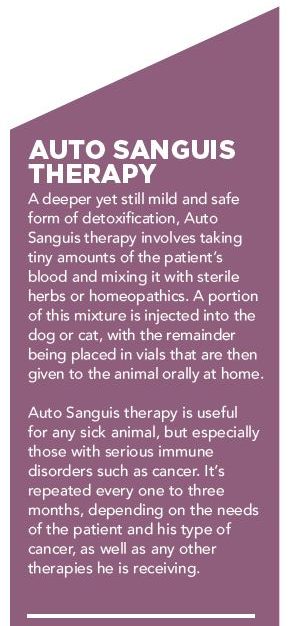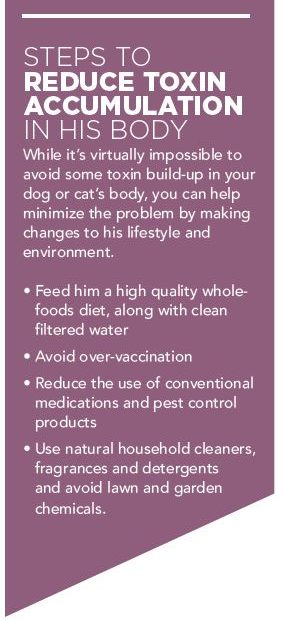Detoxifying your pet – why and when it’s important

Your dog or cat’s body is naturally designed to detoxify itself, but sometimes he needs extra assistance to recover his health and well-being.
We live in a toxic world, and so do our dogs and cats. Good health for our animal companions depends on ridding them of the toxins that build up in their bodies from a range of sources, including vaccines, medications, foods and environmental chemicals. While your dog or cat can naturally eliminate many of these harmful substances from his body, he sometimes needs help, especially nowadays, and that’s what this article is about — detoxification.
What does detoxification mean?
Your dog or cat’s body has built-in systems that naturally get rid of any toxins that accumulate in his body. These systems include:
- Sweating (though this is limited in dogs and cats)
- Exhalation during respiration
- Urination (given properly-functioning kidneys and liver)
- Defecation (depending on a properly-functioning liver and GI system).
However, detoxification via medical intervention is sometimes necessary. It’s a concept that isn’t taught by conventional medicine, but holistic doctors rely upon various herbs, homeopathics, vitamins, supplements and fluid administration to “push” additional detoxification throughout the animal’s body, to allow for quicker healing and cure.
One of my favorite definitions of a holistic detoxification comes from holisticwellnessbasics.com: “Holistic detoxification is a comprehensive multi-organ, total-body cleansing and natural detoxification program. It includes reducing toxin intake, enhancing toxin elimination, and using specific detoxification herbs and other supportive nutraceuticals to strengthen and promote optimum function of the organs.”
Two types
It’s important to note that when I refer to detoxification I’m speaking of two types, depending on the patient’s needs.
 1. Acute
1. Acute
Acute detoxification refers to patients that are acutely ill and need immediate help, or have a chronic problem for which detoxification is needed.
An example of an acutely-ill patient goes by the acronym ADR, which means “ain’t doin’ right”. These animals often have an onset of vomiting or diarrhea, bloody urine or urine with a foul smell, and/or they just don’t feel right (with mild to severe lack of appetite or lethargy). Or they may have abnormal laboratory results (often signifying kidney, liver or adrenal disease).
For dogs or cats with any of these clinical signs, detoxification is done to help them quickly return to normal function. Holistic veterinarians have their own unique ways of performing a detoxification, so my technique may differ from that of your own veterinarian.
- I start with fluid therapy, which can be given intravenously or subcutaneously (under the skin). I typically give the fluids subcutaneously, since it’s easier on the animal and the staff than IV fluids (if the animal is seriously ill, the IV route is preferred). The type of fluid is not as critical as simply getting extra fluids into the animal, although I typically use a balanced electrolyte solution such as Lactated Ringer’s or Normosol.
Many people might question why fluids are needed if the dog or cat is drinking a normal or even higher volume of fluids. While fluids help flush toxins out of the body, a sick animal can never drink enough to totally accomplish this goal. Also, injectable herbal or homeopathic medicines are more easily given through the fluid line rather than in multiple injections.
- To the fluids, I add appropriate amounts of various vitamins, including B vitamins as well as vitamins C, A, D and E, when needed. These vitamins have several purposes – they act as co-factors for various enzymatic reactions, and as antioxidants to reduce oxidative stress to the cells in the body. They are also a natural way to restore appetite and feelings of well-being.
- Homeopathics and/or herbal medicines are also given by injection into the fluids. Which ones are used vary with the patient, but they can include silymarin, berberis and interleukin. These natural medicines function to detoxify the animal and support whichever organs may be damaged.
- For dogs and cats with abnormal lab results, the initial detox is similar to the above, after which lab results are rechecked. As an example, a dog or cat with liver disease would likely have subcutaneous fluids, with vitamins injected into the fluids. Natural medicines such as milk thistle, choline, methionine and interleukin might be given through the fluids. Ongoing organ support and detoxification is administered if the lab results are still abnormal, and involve fluid detox as needed plus herbal and/or homeopathic treatment given orally at home, usually for life, to prevent or minimize further progression of the disease.
2. Chronic
“Chronic” implies “ongoing” or “more than once”. Dogs and cats that receive this type of detoxification are those with ongoing serious issues such as cancer or other chronic disease, as well as those that received an initial detoxification but require more support. It can also include animals that appear healthy but may still suffer from an overload of chemicals/drugs/vaccines in their bodies.
 These animals are given detoxification as already described, and the program is repeated as needed; how often depends on the specific needs of the animal and the state of the disease, but it’s usually every one to three months.
These animals are given detoxification as already described, and the program is repeated as needed; how often depends on the specific needs of the animal and the state of the disease, but it’s usually every one to three months.
Chronic detoxification also involves home care, during which you administer various supplements to your dog or cat to provide ongoing organ support and detoxification. Supplements can include organ glandulars, herbs such as milk thistle or rehmannia, and homoeopathics such as lymphomyosot.
Detoxification is not a term typically used by conventional doctors. While it’s true that the body is designed to detoxify poisons through the liver, kidneys and lungs, holistic doctors understand that safe intervention is required in the case of illness. These doctors don’t replace the body’s natural detoxification mechanisms but rather assist in detoxification. In my own practice, I frequently see the results of detoxification as sick animals recover quickly from their medical disorders. Even when diagnosis is elusive, properly-performed detoxification helps the animal recover. When done correctly, detoxification is an important part of therapy, and reduces the need for chronic drug treatment, restoring the dog or cat to proper function and health.



